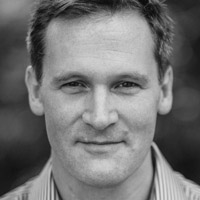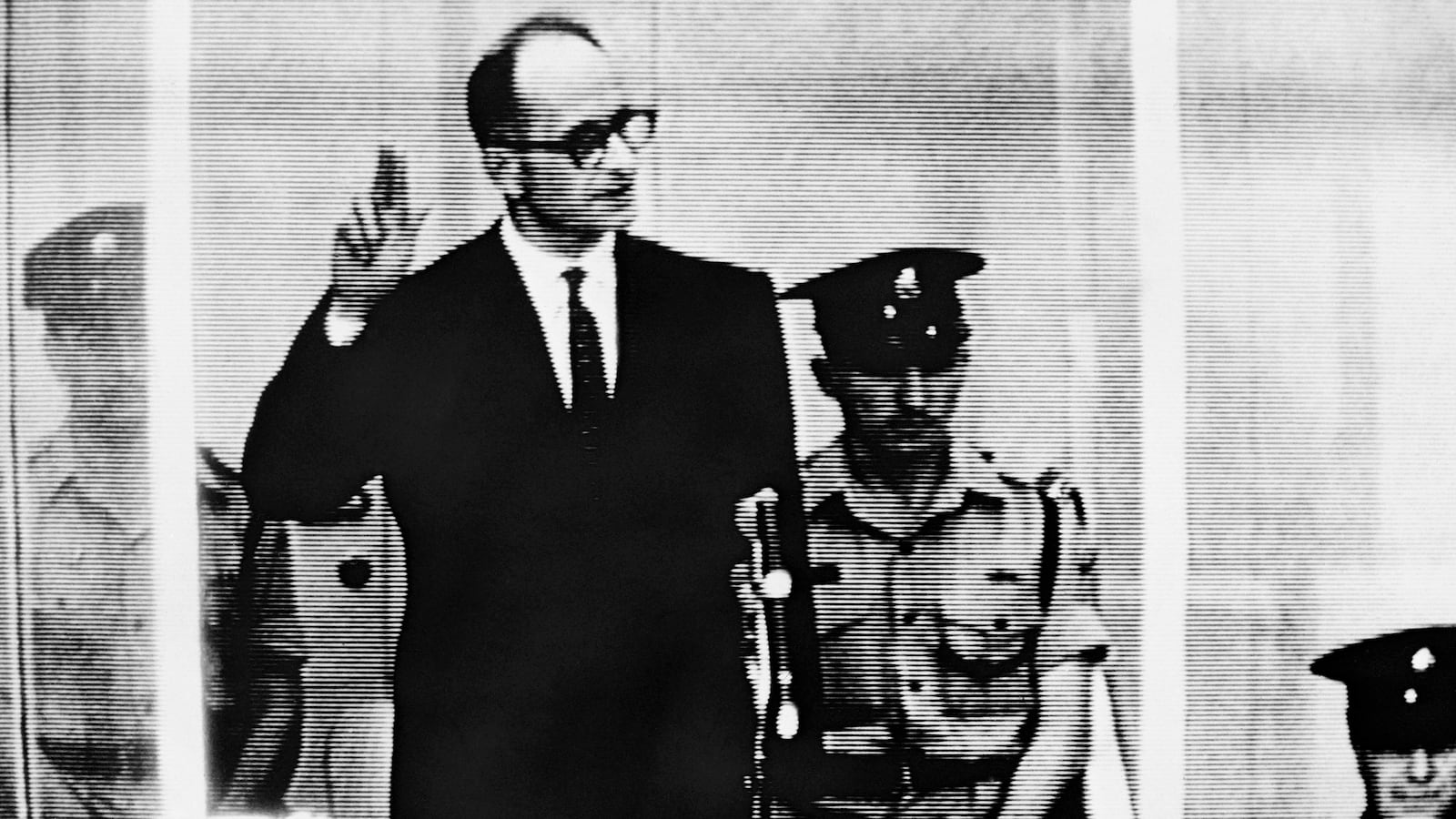Almost 75 years after Hitler’s suicide, the evil of the Third Reich is like the sun; if you stare straight at it, you’ll get burned. We avert our eyes through satire (Springtime for Hitler, the musical within the movie and musical The Producers) or prescriptive outrage (Samantha Power’s A Problem from Hell).
The most famous reckoning with deliberate evil was Hannah Arendt’s Eichmann in Jerusalem. Attending the trial of Adolf Eichmann, Hitler’s Director of Jewish Affairs, in Jerusalem, Arendt was unimpressed with his intelligence and took at face value his assertion that he was a “cog” in the Nazi machine. She went on to argue that he was the apotheosis of the “banality of evil.”
Now, for the first time, someone stares into Eichmann’s evil and presents starkly different results. In Eichmann Before Jerusalem: The Unexamined Life of a Mass Murderer, Bettina Stangneth presents an Eichmann from whom we cannot avert our eyes. She finds that his role in the attempted extermination of the Jewish population of Europe, and his later subterfuges, were all the products of deliberate evil. The result is an extraordinary book. Indeed, the only really good thing that can be said about the book’s topic is that it makes a really good book; the unveiling of evil, with the duped Arendt as a foil, is a great plot indeed.
The book dances with two hidden parallelisms, one between Stangneth and Arendt, and the other between Stangneth and Eichmann himself. Stangneth says at the beginning that her book is a “dialogue with Hannah Arendt,” and the entire structure of the book is a canny rebuttal to Arendt’s book. Stangneth quotes Eichmann boasting in Hungary, in the war’s last year, “I am a bloodhound!” and “I’ll give you all the Jews you want,” but it’s Stangneth who is really the bloodhound.
The book is a hunt for the real Eichmann, and to accomplish that, Stangneth smartly sets up an “origins” story of the years before Eichmann stood trial in Jerusalem in 1962 and was then executed. The technique is familiar in books ranging from Sebastian Montefiore’s Young Stalin to Tom Stoppard’s Shakespeare in Love, and it has profound effects here.
Her journey begins in Eichmann’s youth, his entry into the Nazi Party, his bravado-filled adoption of the crusade against the Jews, his escape after the war, first into Austria and then Argentina, and the months leading up to the famed trial that Arendt witnessed.
Through unprecedented granular detail, Stangneth unearths exactly what Arendt obscured with her “banality” thesis—that Eichmann was fully in possession of his faculties at every step of the way, not only in murdering so many people, but in hiding from that fact afterward.
At each stage, the meticulous quality of her research and her distinctive moral outrage make the journey enthralling. In Austria in the late ’40s, a fugitive Eichmann renamed himself Otto Heninger and begins farming eggs and bargaining over chickens and firewood with the Jews from a nearby displaced persons camp—facilities previously used as the concentration camp Bergen-Belsen. And all the while, he would later tell a sympathetic interviewer in Argentina, he was thinking to himself, “You’ll see, the thunder will come again, and you’ll all be killed, and there those fellas are, doing deals with me, you know?”
Through his years in hiding, Eichmann’s forced anonymity eats away at the intentional zealot. In an Israeli cell in 1961, he admits that the most suffering after 1945 was “the mental burden resulting from the anonymity of my person.”
In Peron’s Argentina, Eichmann, under the pseudonym Ricardo Klement, falls in with a group of former Nazi émigrés. To make a living, he gets a job as a manager at a hydroelectric plant. He eventually brings his wife and children over, and later he manages a hen and rabbit farm. Interacting with “comrades old and new,” he proudly employs his Nazi title—“Obersturmbannführer Eichmann from the Jewish Department.”
Stangneth probes his affairs in Argentina, including with Ingrid von Ihne, “tall, blond, and slim, with a cold beauty.” But her interest is not prurient. She wants to puncture all of the caricatures that blunt the harsh reality of Eichmann. He was not a “Holocaust monster,” she argues, an “orgiast, who, having become intoxicated by murder and lost his moral compass, satisfies his sexual urges over the graves of his victims.” Instead, he was placing an “emphasis… on his own potency.” His sexual life, just like his barbarism, was the result of deliberation, not appetites run amok.
The real revelations in the book center around Stangneth’s plunge into new transcripts of the famous interviews of Eichmann performed by the sympathetic anti-Semitic Dutch émigré Willam Stassen in Buenos Aires, with about a dozen other men present. The full transcripts were only released in the late ’90s, which is one reason why Stangneth’s book has the flavor of a detective story.
One confession of Eichmann’s in particular devastates Arendt’s banality of evil thesis—a “little address” that did not appear in the most notorious version of the Stassen transcripts that Stassen sold in 1960. Stangneth spends three pages on the full excerpt, and it’s the heart of the book, the heart of what Arendt missed, and the heart of Eichmann’s evil.
After explaining that if 10.3 million Jews (rather than 6 million) had been killed, he says, “I would be satisfied, and would say, good, we have destroyed an enemy.” He then says, “I too am partly to blame for the fact that the real, complete elimination, perhaps foreseen by some authority, or the conception that I had in mind, could not be carried out.”
There’s a lot more, and the section has the satisfying snap of a case being closed. Stangneth crisply argues that “Eichmann’s words in Argentina … weren’t thoughtless drivel but consistent speech based on a complete system of thought. They were, we might say, judgments in excess.”
We come away from this fine, important book understanding that the old Anglo legal concept of mens rea—the mental intent that distinguishes murder from manslaughter—matters more than ever.
Stangneth has been faulted by some reviewers for not being a sufficiently dispassionate historian. But she trained as a philosopher, not as a historian, and she’s employing history not for its own sake, but for philosophy’s. Just as Arendt herself did in Rahel Varnhargen, a portrait of a pre-World War II Jewish Berlin hostess and intellectual that described the richness of Jewish life in Europe before the Nazi destruction, Stangneth uses Eichmann’s story to make a broader point about humanity itself.
It’s also refreshing when she speaks from the heart, non-academically, describing Eichmann’s behavior as “unbelievably shameless” and offering her ringing conclusion, “Now the age of his ability to manipulate and distract people with his lies is over.”
When we stare directly into the burning eye of evil, our retinas might be burned, she is saying, but as long as we can scream with outrage, we have at least responded in kind.






